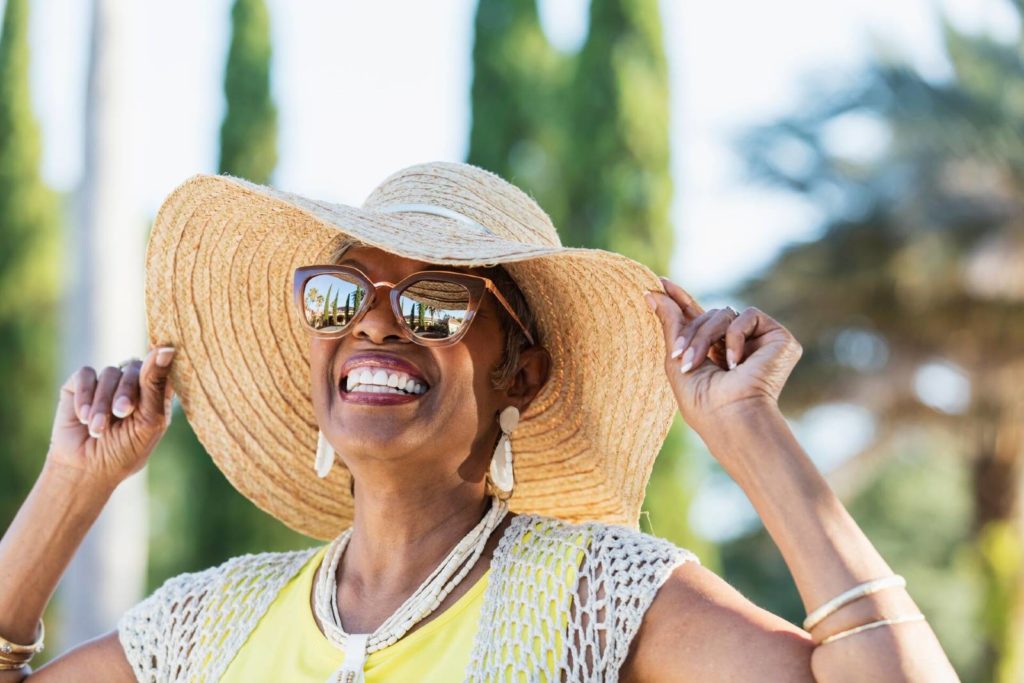Are older adults more susceptible to high temperatures and heat-related illnesses? According to the Centers for Disease Control and Prevention, they are. Seniors engaged in outdoor activity during the summer months should be extra cautious. Chronic health conditions and prescription medications can leave seniors vulnerable to the effects of too much heat and sun, and it’s important to recognize the warning signs of heat exhaustion. If you’re an older adult, or you have older loved ones in the family, be extra mindful during the summer months and follow these summer safety tips to protect them from heat- and sun-related health problems.
It comes with the territory.
Not everyone thrives in summer heat. Here in Dallas, even younger adults feel the effects. But older bodies especially don’t handle excessive heat in the same way they once did. For example, older adults don’t regulate body temperature or store fat as efficiently. They don’t tolerate high temperatures well. Add high levels of humidity, and the risk of heat stroke and serious health issues for seniors increases. Underlying conditions such as congestive heart failure, diabetes, and chronic obstructive pulmonary disease (COPD) pose an increased risk of heat-related health complications as well. UV rays from the summer sun are a risk factor for skin cancer, which is a serious threat for seniors.
Extreme weather. Extreme heat.
Climate Central, an independent organization of scientists and journalists researching and reporting facts on the changing climate, has cited heat as the top weather killer, surpassing hurricanes and tornadoes. Their report goes on to say that each year, some 12,000 Americans die from heat-related causes, and more than 80% of them are ages 60 or older. When the temperature climbs above 80 degrees, older adults need to be proactive and stay hydrated, watch for the warning signs, and avoid the potential dangers of excessive heat. The most common heat-related afflictions Too much heat isn’t safe for anyone, and prolonged exposure to excessive heat can lead to any of a number of illnesses, collectively known as hyperthermia. Here’s what to watch for: Heat syncope is sudden dizziness that can happen during physical activity in hot weather. If an individual isn’t used to high temperatures or is taking a heart medication called a beta blocker, they’re even more likely to feel faint. Have them rest in a cool place, legs up, and drink water to make the dizzy feeling go away. Heat cramps are the painful tightening of muscles in the stomach, arms or legs that can result from physical exertion in high temperatures. Though body temperature and pulse usually remain normal during heat cramps, the skin can feel moist and cool. Rest in the shade or inside a cool building to cool down. Drink plenty of water. Heat edema is a swelling in the ankles and feet as a result of overheating. Elevate the legs to help reduce swelling. If that doesn’t work fairly quickly, get to a doctor. Heat exhaustion is a warning that the body can no longer keep itself cool. The signs may include feeling thirsty, dizzy, weak, uncoordinated and nauseated. There may be profuse perspiration. Though body temperature may remain normal, the skin might feel cold and clammy. Some people with heat exhaustion have a rapid pulse. Rest in a cool place and drink plenty of fluids. If the individual doesn’t recover soon, get medical care. Be advised — heat exhaustion can quickly progress to heat stroke. Heat stroke is a medical emergency. It occurs when the body reaches a temperature of 104 degrees or higher, typically following prolonged exposure to excessive heat. Symptoms can include confusion, altered speech, nausea or vomiting, rapid breathing, and a racing heartbeat. Older people living in homes or apartments without air conditioning or fans are at greatest risk for heat stroke.
Exposure to the sun.
As we age, the skin becomes thinner and more susceptible to sun damage. Older adults are at higher risk for common types of skin cancer, according to the National Council on Skin Cancer Prevention. The cumulative effect of decades of UV exposure increases risk because of decreased autoimmune function. Benign skin lesions, brown spots, and other signs of aging might also make it more difficult for older adults to identify potentially malignant spots in time for effective treatment. Melanoma is the most serious form of skin cancer, and now accounts for about 3% of skin cancer cases. Recognizing the signs of melanoma
- A change in the appearance of skin, especially in the size or color of a mole, growth or spot, or a new growth (even if it’s colorless)
- Moles with irregular edges or borders
- Scaliness, oozing, bleeding, or a change in the way a bump or nodule looks
- A sore that doesn’t heal
- The spread of pigmentation (color) beyond its border, such as dark coloring that spreads past the edge of a mole
- A change in sensation, such as itchiness, tenderness or pain
Six simple solutions for summer safety
Stay hydrated. Everyone should drink eight glasses of water a day, especially those over 65. Seniors lose some ability to conserve water as they age. They don’t always realize when they’re dehydrated and thus are prone to experience heat stroke. Diuretics from caffeine or medication are also contributing factors. Reportedly, up to half the older people brought to the ER during the summer months are there because of dehydration. Dress appropriately. Light-colored, loose-fitting clothing will keep a person cooler. Breathable fabrics like cotton also help regulate body temperature. Wear a hat with a broad brim and polarized sunglasses to keep the sun’s rays out of the face and eyes. Wear sunscreen. This is important for seniors because prescription medications can make the skin more sensitive to the sun. Applying a broad-spectrum sunscreen with an SPF of at least 30 will help avoid sunburn. Avoid exposure to the sun, particularly for prolonged periods of time. This means anything more than 10 or 15 minutes, especially on days where the temperature reaches above 90 degrees. Try to plan outdoor activities for the early morning or after the sun sets. Take advantage of air conditioning. Spending time in the fresh air — in the shade — is an enjoyable part of summer, but older people especially should seek to have a number of public and private venues available where they can relax in the comfort of AC. Know when to cool down. If you’re feeling overheated, take a bath or shower in neutral-temperature water to cool down. You can also apply cool washcloths to the neck, wrists and armpits. Because poor circulation, heart disease, high blood pressure, and an inability to perspire due to certain medications place seniors at higher risk of heat-related illnesses, they (and you) need to be extra vigilant.
Rise above it all at Ventana by Buckner
Here at Dallas’ only high-rise senior living community, you can expect an exceptional experience steeped in comfort, wellness and healthy living options. You’ll also enjoy extraordinary services that meet your social, physical, emotional and spiritual needs. Ventana puts your wellness first, and ensures you have the resources available to stay healthy and have fun doing it. For answers to specific questions, general inquiries, or to schedule a tour of Ventana’s vibrant community, contact us anytime.

